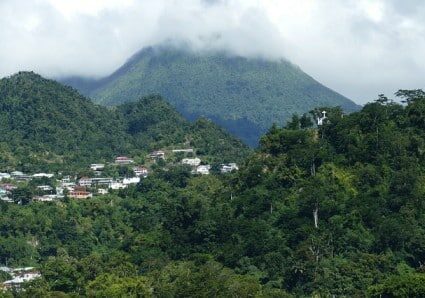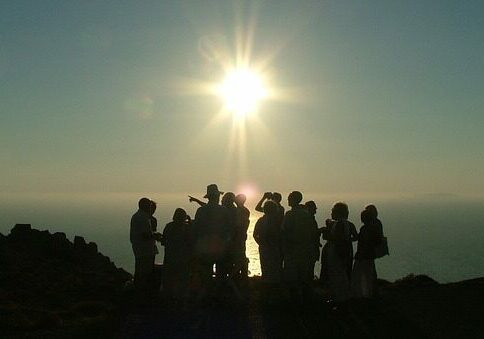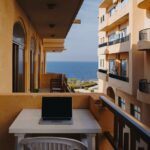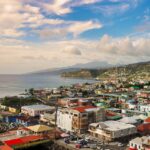Wondering how you can retire in Dominica? While the country does not have a retirement visa, it does make it easy for foreigners to spend their golden years in this stunning Caribbean island nation. There are many pros to retiring in Dominica, which we will explore in this article. From exploring the ‘Nature Island’ of the Caribbean to enjoying a relaxed pace of life in one of the cheapest Caribbean islands, Dominica is certainly somewhere you can live comfortably as a retiree.
Why should you retire in Dominica?
Breathtaking natural
landscape
A tranquil and relaxed
way of life
Affordable
cost of living
Private healthcare
available
Favorable
tax environment
Second passport via Dominica's citizenship program
Best Place to Retire for Nature Lovers

Dominica’s currency is the Eastern Caribbean Dollar (EC$ or XCD), which is used by several other Caribbean nations and is pegged to the American Dollar at the consistent exchange rate of EC$2.70 to US$1.00. Having a stable currency tied directly to the US Dollar eliminates a sizable risk often faced by people making foreign financial investments
Whichever city you choose for Dominica retirement, you will always find nature around you with plenty of things to do in Dominica. Even in Roseau, the bustling capital, you will find breathtaking views of the Caribbean Sea and the tropical forest. Some of the best cities to live in Dominica are Roseau – the capital city, Portsmouth, Soufriere, and Marigot.
Largely preserved from mass tourism, Dominica is a piece of heaven for those looking to retire in a quiet place with plenty to do.
Low Cost of Living in Dominica
Why Dominica is the best Caribbean island to retire is its affordable living costs, allowing retirement income and savings to stretch. Local products such as vegetables, fruits, fresh bread, local cheese, and rice are cheap compared to the US or the UK. Head to one of the numerous local markets on the island and buy some fresh, organic, and locally grown fruits and vegetables.
Real estate in Dominica can be quite affordable, depending on your requirements. Rent in Dominica is also quite low compared to the rest of the world. For example, the monthly rent for a one-bedroom apartment in the capital city of Roseau is around $333, while a three-bedroom apartment is around $1,356 per month.
Of course, these prices are reflective of living in the city center. You’ll find that apartments outside of the city center are even cheaper, with prices as low as around $209 for a one-bedroom apartment and $838 for a three-bedroom apartment per month.
To the joy of those who appreciate Dominica’s local cuisine, eating and dining out is also cheap. Enjoy a local meal in an inexpensive restaurant for about $7 and a three-course meal for two people at a mid-range restaurant for around $70.
Transportation options are varied, as you can get around the island on foot, by car, bus, etc. Dominica’s first international airport is in progress and is set to increase the island’s accessibility and boost tourism, as visitors will no longer have to get a connecting flight from nearby islands. Dominica is a popular port for cruise ships, and ferries and boats are available to take you island hopping.
Read our expert guide about the cost of living in Dominica to plan your budget and make an informed decision before relocating to this beautiful island.
Tax Freedoms in Dominica
Dominica taxes appeal to many foreign nationals. This is because Dominica doesn’t impose any wealth, gift, inheritance, or capital gains tax. Additionally, there is no foreign income tax, so retirees living in Dominica can remit foreign social security payments to the country tax free. To become a tax resident as a retiree, you must reside in the country for at least 183 days during the year.
US citizens retiring in Dominica should be aware of the possible tax implications of owing taxes on their social security income to the IRS, as the United States taxes its citizens on worldwide income, regardless of having a primary residence abroad.
Healthcare in Dominica
Community healthcare services are free in Dominica. You can also find affordable private health services. However, depending on what kind of treatment you need, you might not find many specialized health services. It is highly recommended that retirees get a private healthcare scheme when living on the island of Dominica. You can also have a look at these health insurance companies that offer full coverage international health insurance for expats living in Dominica: Allianz, Cigna Global Health, and Clements Worldwide.
Overall, the cost of healthcare in Dominica is relatively low compared to other countries, making it one of the cheapest Caribbean islands for retirees and those looking for affordable healthcare options. The nation’s government has invested heavily in healthcare, resulting in the country having a high doctor-to-patient ratio compared to other islands in the region.
Dominica Citizenship for Retirees
Can I retire in Dominica and live there permanently? Believe it or not, this is a common question faced by many retirees. As mentioned above, Dominica does not offer a retirement visa, and a tourist visa won’t give you the length of stay you likely desire. Fortunately, the Dominica offers a dual citizenship by investment program. An advantage of Dominica vs Grenada citizenship and others is its affordability. This is the best option for retiring in Dominica as it allows you and qualifying family members to obtain citizenship in Dominica.
There are two investment routes to be granted citizenship:
- Donate $200,000 to the Economic Diversification Fund (EDF).
- Making an approved real estate purchase worth at least $200,000.
Each option offers unique advantages, but both guarantee that you can enjoy a life-long stay in Dominica. The application process is straightforward, and you can acquire the Dominica passport for you and your family in as little as three months. You can even pass your citizenship on to future generations, allowing them to enjoy the laid-back lifestyle offered by this Caribbean island.
Among many advantages, a Dominica Caribbean passport allows you to buy land on the island and travel to more than 140 countries visa free. Furthermore, investing in Dominica real estate allows you to benefit from the nation’s thriving tourism industry, and the background check doesn’t require visiting Dominica to complete the citizenship process.
Other Dominica immigration options
If you do not want to invest in Dominica, you can also apply for the Dominica temporary residency visa. Your temporary residency permit must be renewed every year for five consecutive years before you can obtain permanent residency. Below is a list of the required documents you will generally need to present when applying for your residency permit:
- Two application forms
- Passport
- Medical certificate
- Bank statement
- Criminal record
- Two passport-sized photos
- Two testimonials (one from your last employer)
- Cover letter explaining the reason for your application
- Marriage certificate
- Receipt showing payment of application fee
While this is an excellent route for retiring in Dominica, bear in mind that you will not be able to buy land without an Alien Landholding License or obtain citizenship through this path.
Expats Communities in Dominica
Relocation can be a stressful process, even more so if you do not have any connections in your new home. Just like you, there are plenty of like-minded individuals who have chosen to retire and live in Dominica.
English is the official language of Dominica, but French and French Creole are also widely spoken. With Dominica being a popular retirement destination and thanks to the nation’s diverse community of expats, you are also likely to hear a variety of other languages from several countries and be exposed to many different cultures.
You can find expat groups on platforms like Facebook, where you can find like-minded individuals experiencing the same changes as you. You can also make new acquaintances on forums or take a look at these companies that specialize in connecting expats together:
- InterNations: Build new friendships and connect with like-minded individuals through events and diverse activities.
- MeetUp: Find new communities by interacting with individuals sharing the same interests as you.
As you can see, Dominica is an ideal location for the whole family, not only retirees. The cost of living is significantly lower than in places like the US and the UK, there are quality healthcare services available, there are plenty of white sand beaches where you can soak up the sun, and you can obtain second citizenship through the nation’s economic citizenship program. So, why not take the first step and make your dream of retiring in Dominica a reality?
Dominica Culture
Like many other Caribbean nations, such as Barbados, St Kitts, the Dominican Republic, and St Lucia, Dominica culture is comprised of Kalinago (indigenous Caribbeans), African, and European influences. This former British Overseas Territory is renowned for its dance and music traditions, all of which come together in the island’s famous World Creole Music Festival. With multi-continental cultural influences, Dominica cuisine offers a rich and diverse array of flavors, featuring dishes like Mountain Chicken, Callaloo Soup, and Fish Braff.
Dominica is committed to environmental preservation, and its stunning natural landscapes and lush rainforests also play a significant role in its cultural identity, as proven by its 2022 Caribbean Sustainable Awards. Dominicans’ deep connection to nature is emphasized through sustainable living, and expats and retirees are expected to adopt and respect these environmentally friendly practices, such as conservation efforts, recycling, and supporting local, eco-conscious businesses.
Frequently Asked Questions about Retiring in Dominica
Is it expensive to retire in Dominica?
Retiring in Dominica is relatively cheap compared to the rest of the Caribbean countries, the US and the UK. Local products and real estate are actually cheap. The East Caribbean Dollar, Dominica’s currency, is pegged to the US dollar at a rate of EC$2.70 to US$1.
How to retire in Dominica as a foreigner?
Thanks to the Dominica Citizenship by Investment program, it is now possible for foreigners to retire and live permanently in Dominica, provided that a donation of at least $100,000 is made to a government fund or you purchase real estate with a value of at least $200,000. You can also apply for a temporary residence permit, which has to be renewed each year and doesn’t allow you to purchase land.
What is the best city to live in Dominica for expats?
Some of the best places to live in Dominica if you want to experience the island’s vibrant culture are Roseau and Soufriere. If you’re drawn to Dominica’s pristine beaches, Portsmouth and Marigot are ideal places to live.
Is there a healthcare system in Dominica?
In Dominica, there are free community healthcare services. You can also find affordable private health services. However, it is highly recommended to get a private health care scheme when moving to Dominica.
How can I get the Dominica passport?
In order to get a Dominica passport, you have to make an investment through the Dominica Citizenship by Investment Program. An investment of at least $100,000 is required, and foreign investors can choose between donating to the Government’s Economic Diversification Fund or making a real estate purchase. The program allows you to obtain Dominica citizenship and enjoy its many advantages, such as visa-free travel to over 140 countries, favorable tax policies, and the opportunity to live in Dominica.
Is it safe to retire in Dominica?
Yes, it is safe to retire in Dominica. The country has a very-low rate of criminality.
How much does it cost to retire in Dominica?
Retiring in Dominica is relatively cheap, as Dominica is one of the more affordable islands in the Caribbean. The average living cost per month for one person is around $600, excluding rent. The average monthly rent for a one-bedroom apartment in the city center is about $355.
Can I retire in Dominica?
Yes, retiring in Dominica is possible thanks to The Dominica Citizenship by Investment scheme. The program enables foreigners to retire and establish permanent residency in Dominica by making an investment of at least $100,000 in a government fund or real estate.
Are there tax exemptions when retiring in Dominica?
Dominica as a retirement destination offers several tax exemptions for retirees, contributing to the “Nature Island’s” reputation as one of the most affordable Caribbean countries to retire to. Income tax in Dominica is residency-based. Senior property owners over 65 with properties word $200,000 of less are eligible for a 50 percent tax reduction on annual municipal property taxes. Properties used for religious of charitable purposes are exemption from Dominica taxation. Tax residents can also deduct charitable donations to non-profit organizations approved by the Dominica cabinet from taxable income.

 Gizane Campos
Gizane Campos 


